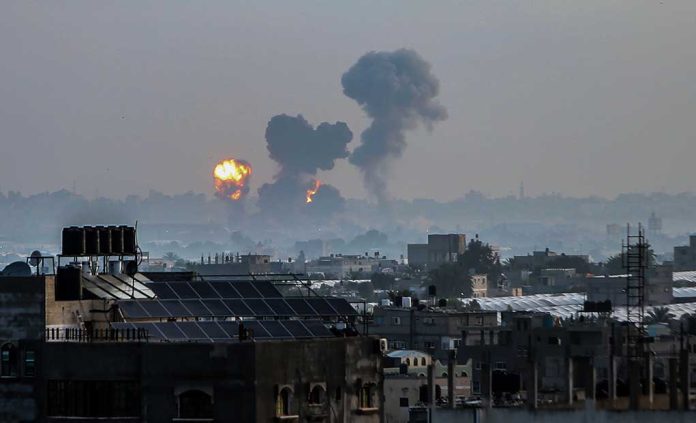
A deadly explosion at a Cuban ammunition depot claims 13 soldiers’ lives and forces over 1,200 residents to evacuate.
At a Glance
- 13 soldiers killed in an ammunition depot explosion in eastern Cuba
- Explosion likely caused by a short circuit and power failure
- Over 1,200 nearby residents evacuated for safety
- Cuban leader honors deceased soldiers as heroes
- Access to explosion site restricted due to hazardous conditions
Tragic Explosion Rocks Cuban Ammunition Depot
In a devastating incident that has shaken the nation, the Cuban government announced the death of 13 soldiers following an explosion at an arms depot in eastern Cuba. The tragedy occurred in Melones, a location approximately 450 miles east of Havana, sending shockwaves through the local community and beyond. Initial reports suggest that the catastrophic event was likely triggered by a short circuit and subsequent power failure, highlighting the critical importance of electrical safety measures in sensitive military installations.
#CUBA: The government said Wednesday that 13 soldiers had died after an explosion a week earlier in an arms depot in the country's east. The Ministry of the Revolutionary Armed Forces said in a statement that "it is officially declared that the 13 comrades are deceased." pic.twitter.com/KSArvAhV0g
— CaribbeanNewsNetwork (@caribbeannewsuk) January 16, 2025
Swift Evacuation and Emergency Response
In the aftermath of the explosion, authorities acted swiftly to ensure the safety of nearby residents. Over 1,200 people were evacuated from the surrounding area, demonstrating the government’s commitment to protecting civilian lives in the face of potential further dangers. This rapid response underscores the effectiveness of emergency protocols and the readiness of local authorities to handle such critical situations.
The evacuation process, while necessary, has undoubtedly caused disruption and concern among the affected communities. However, the priority remains the safety and well-being of all citizens, a principle that guides the actions of responsible governance in times of crisis.
Hazardous Conditions Hamper Investigation
As authorities work to investigate the cause of the explosion and assess the extent of the damage, they face significant challenges. Access to the explosion site is severely restricted due to a combination of complex terrain, the presence of toxic gases, and severe structural damage. These hazardous conditions not only complicate the investigation but also highlight the ongoing risks faced by emergency responders and recovery teams.
The restrictions on site access serve as a stark reminder of the dangerous nature of ammunition depots and the potential for long-lasting environmental and safety impacts following such incidents. It underscores the need for stringent safety protocols and regular inspections to prevent similar tragedies in the future.
National Mourning and Recognition of Fallen Heroes
In response to this national tragedy, Cuban leader Miguel Díaz-Canel Bermúdez has stepped forward to express his condolences and honor the deceased soldiers. In a moving gesture of respect and transparency, the government publicly named all 13 soldiers in a social media post, recognizing their sacrifice and service to the nation. This act of acknowledgment serves to humanize the tragedy and provide a focal point for national mourning.
The leader’s decision to label the fallen soldiers as heroes reflects the country’s deep appreciation for those who serve in the armed forces and emphasizes the risks they face in the line of duty. It also serves as a rallying point for national unity in the face of adversity, as the country comes to terms with the loss of these brave individuals.
Evolving Understanding of the Incident
As more information comes to light, the narrative surrounding the explosion has evolved. Initially, the soldiers were reported as missing, and the explosion was attributed to a fire at a construction site. This progression of information highlights the challenges of accurate reporting in the immediate aftermath of such incidents and the importance of patience as investigators work to uncover the truth.
Sources:
13 Cuban soldiers dead after explosion at ammunition depot, government says



